Classics of the Radical Reformation (9 vols.)
Digital Logos Edition
These resources are not currently available.
Overview
Classics of the Radical Reformation is a series of Anabaptist and Free Church documents translated and annotated under the direction of the Institute of Mennonite Studies. The series offers scholarly, critical English-language editions of key Radical Reformation works—accurate, stylish, and polished translations geared toward a wide audience. In nine rich volumes, this series encapsulates the Radical Reformation.

- Works from key sixteenth-century Anabaptist reformers
- Volume-specific introductions, bibliographies, notes, and indexes
- Title: Classics of the Radical Reformation
- Publisher: Herald Press
- Volumes: 9
- Pages: 4,325
- Christian Group: Anabaptist
- Resource Type: Collected Works
- Topic: Theology
This title is included in the following collections
You can save when you purchase this product as part of a collection.
Logos 6 Baptist Platinum Legac...
$1,499.99$1,499.99Logos 5 Baptist Platinum Legac...
$1,499.99$1,499.99Logos 6 Baptist Diamond Legacy...
$2,999.99$2,999.99Logos 5 Baptist Diamond Legacy...
$2,999.99$2,999.99
- $4,749.99
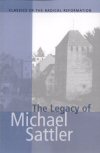
Michael Sattler has been called, by admirers and critics, the most significant first-generation leader of Anabaptism. This is a collection of documents by and about Sattler, edited by John Howard Yoder, with introductions and extensive notes.
Translations by Yoder are faithful to the original.
—Mennonite Quarterly Review
Reading these works with Yoder’s notes acquaints one with the distinctive concerns of the early Anabaptists and the issues in the formative period of Reformation dissent.
—Restoration Quarterly
An excellent tool for study from the original text by students of Anabaptist thought.
—Church History
John Howard Yoder (1927–1997) taught ethics and theology at Notre Dame University and Associated Mennonite Biblical Seminary. He received his doctorate from the University of Basel, Switzerland, and was a member of the Mennonite Church in Elkhart, Indiana.
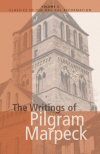
During the sixteenth century’s tumultuous years of religious reformation and revolution, Pilgram Marpeck consistently but discreetly stood up to the ruling powers, calling for freedom of religion and separation of church and state. Coming from a background of wealth and education, he engaged in the major theological struggles of the Anabaptists, fighting for an identity built on the Bible and meaningful to the world. This book includes Marpeck’s “Confession of 1532” and “Admonition of 1542”—the longest and most detailed statement of the Anabaptists on baptism and the Lord’s Supper. Also included are 16 of his letters and the preface to his “Explanation of the Testaments.”
William Klassen is an adjunct professor and Principal Emeritus at St. Paul’s College, University of Waterloo, Ontario. He has been a professor of New Testament and Peace Studies at Associated Mennonite Biblical Seminary, the University of Manitoba, Simon Fraser University, the University of Toronto, and the Ecole Biblique, Jerusalem.
Walter Klaassen is an adjunct professor in the Department of History at the University of Saskatchewan. His research interests include church history, particularly of radical movements such as Anabaptism.
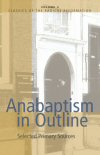
This volume is designed to make the primary writings of sixteenth-century Anabaptists more accessible in the English language. It contains 274 selections from 37 Anabaptist writers, divided into 17 categories of theology and church life, including:
- Jesus Christ: God’s Revelation
- The Work of God in Man
- The Holy Spirit
- Cross, Suffering, and Discipleship
- The Church
- Church Order
- The Bible
- Baptism
- The Lord’s Supper
- Church Discipline
- Economics
- Government
- Nonresistance
- The Oath
- Religious Toleration
- Relations to Other Christians
- Eschatology
The book is a useful tool for pastors, teachers, and for individuals who have a special interest in getting more closely in touch with the primary experiences and thinking of the sixteenth-century Anabaptists.
—Festival Quarterly
There are still relatively few sixteenth-century Anabaptist materials available in the English language, though their number is increasing. This book will facilitate specific theological study of issues which might be impossible for the uninitiated reader.
—C. J. Dyck
Belongs in all academic and better public libraries.
—Religious Studies Review
An invaluable tool.
—Studies in Religion
Walter Klaassen is an adjunct professor in the Department of History at the University of Saskatchewan. His research interests include church history, particularly of radical movements such as Anabaptism.
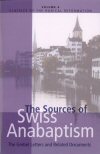
This volume’s 170 letters and documents portray how Conrad Grebel, a bright young Swiss patriot, became a fervent, influential leader of the sixteenth-century Anabaptist movement. The editor, Leland Harder, calls the book “a drama with five acts, prologue, and epilogue” with a cast of 107 characters. The main characters are Grebel and Huldrych Zwingli, vicar at the Grossmünster in Zurich.
The climax of the drama comes in January 1525 when Grebel performs the first rebaptisms, signaling the founding of a new church and the rejection of the Anabaptists by Zwingli. It’s a moment rich in implications for future Christians. “These letters and documents are not published for scholars only,” states Harder, “but for all seekers and believers.”
Leland Harder is living in active retirement in North Newton, Kansas. He taught for 25 years at Associated Mennonite Biblical Seminary in Elkhart, Indiana. As a sociologist he extensively gathered and interpreted data about Mennonite church membership. In retirement he has worked on numerous family reunion and genealogy projects.
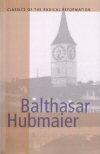
This volume includes the complete writings of Balthasar Hubmaier, including his notable treatises on believers and infant baptism, the Lord’s Supper, Free Will, prayer, fraternal admonition, and more. Translated, edited, and annotated by H. Wayne Pipkin and John H. Yoder, it includes five indexes, a bibliography for further study, and numerous illustrations.
Fulfills all expectations, providing an English-speaking audience access to the thought of Anabaptism’s only doctor of theology.
—The Conrad Grebel Review
Hubmaier’s nuances and precision are well reflected. Informative footnotes add much.
—Church History
Provides important insights and raises questions deriving from the last 30 years of Anabaptist research.
—Zwingliana
A major achievement.
—Journal of Mennonite Studies
The definitive rendering into English of the Hubmaier corpus.
—The Mennonite Quarterly Review
A task well done.
—Sixteenth Century Journal
Long overdue and anxiously awaited. Readers can now discover for themselves the Anabaptist foundation of religious freedom.
—Journal of Church and State
A beautiful piece of work, both editorially and aesthetically.
—Franklin H. Littel, Temple University
H. Wayne Pipkin served as a professor of church history at The International Baptist Theological Seminary from 1978 to 1989. In 2003, he was appointed director of the American Baptist—Samuel Colgate Historical Library.
John Howard Yoder (1927-1997) taught ethics and theology at Notre Dame University and Associated Mennonite Biblical Seminary. He received his doctorate from the University of Basel, Switzerland, and was a member of the Mennonite Church in Elkhart, Indiana.
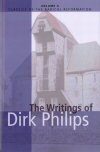
This English translation from the original 1564 Dutch volume contains all the known writings of key Anabaptist leader Dirk Philips. Covering the incarnation, baptism and the Lord’s Supper, the sending of preachers, the tabernacle, the new birth, marriage, and more, Philips’ treatises are important contributions to the literature of early Anabaptism. Fully annotated with introductions, this volume is useful for general readers and scholars alike.
Cornelius J. Dyck received his bachelor’s degree from Bethel College, his MA in history from Wichita State University, and his BD and PhD from the Divinity School of the University of Chicago. From 1958 to 1989 he taught historical theology and church history at the Associated Mennonite Biblical Seminaries. For 21 years, Dyck served as director of the Institute of Mennonite Studies. He has contributed articles to The Mennonite Quarterly Review, encyclopedias, and papers.
William E. Keeney (1922–2006) received his bachelor’s degree from Bluffton College and his master’s and doctorate degrees from Hartford Theological Seminary. He taught at Bluffton College, Bethel College, and Kent State University. Keeney served on the editorial boards of Mennonite Quarterly Review and Mennonite Life.
Alvin J. Beachy (1913–1986) received his ThD from Harvard University Divinity School. He served as a pastor in several congregational churches in Connecticut, Massachusetts, and Pennsylvania. Beachy taught at Bluffton College, Eastern Mennonite College, and Bethel College. He contributed articles to The Mennonite Quarterly Review, Mennonite Life, and Worship as Celebration of Covenant and Incarnation.
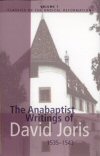
David Joris (c. 1501–1556) is one of the least understood leaders of the sixteenth-century Anabaptist movements. Yet during his era, he was one of the most important Anabaptist leaders in the Low Countries. Even before the fall of Munster in June 1535, Joris was a consistent advocate of Anabaptist nonviolence, and well into the 1540s, he competed successfully with Menno Simons for followers. This volume contains several of Joris’ tracts, including “Of the Wonderful Working of God,” “Hear, Hear, Hear, Great Wonder, Great Wonder, Great Wonder,” “The Strasbourg Disputation,” and more.
Gary K. Waite received his BA, MA, and PhD from the University of Waterloo. He is an associate professor at the University of New Brunswick. He has published numerous articles on David Joris and Anabaptism.
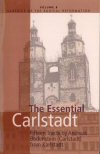
Although he was not an Anabaptist, Radical Reformer Andreas Bodenstein (Carstadt), 1486–1541, had a strong influence on the Anabaptist movement. In 1534, he joined the faculty at the University of Basel. A professor of biblical studies at Wittenburg, Carlstadt became involved in radical changes that brought him into conflict with Luther.
These 15 tracts, translated and edited by E. J. Furcha, represent the first major collection of Carlstadt’s writings in one volume. They give excellent insight into his faith and exemplary zeal as a reformer of the church “from below.”
E. J. Furcha is a professor of church history at McGill University. He has edited or translated numerous volumes on radical reformers like Schwenckfeld, Zwingli, Hans Denck, and Sebastian Franck.
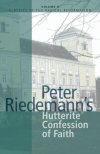
John J. Friesen gives a fresh translation of the 1565 German edition and offers a new history of Riedemann.
While in prison from 1540 to 1542, Riedemann wrote to the Lutheran ruler, Philip of Hesse, an explanation of the Hutterite goal of a renewed community, dispelling many popular misconceptions. The Hutterites quickly accepted Riedemann’s Confession as their own. He had creatively woven together a fresh reading of the Bible with the classical creeds, producing a powerful synthesis of Scripture and tradition on which to base Christian community. His dynamic vision of radical and communal discipleship still challenges believers toward greater faithfulness to the Lord and to each other. Riedemann’s Confession gives theological grounding for the Hutterite understanding of economic communalism and offers practical examples of it. This Confession still guides Hutterite communities today.
Peter Riedemann’s Hutterite Confession of Faith, fully annotated with an introduction to Reidmann’s life, also includes John J. Friesen’s translation of the 1565 German edition of “Confession of Our Religion, Teaching, and Faith” by the Brothers Who Are Known as the Hutterites.
This volume is a comprehensive guide to daily life in the Hutterite community and is the basic charter for Hutterites even today.
—John A. Hostetler, author, Hutterite Society
Friesen deserves our gratitude for his labor of love in this modern, easy-to-read but accurate translation.
—Werner O. Packull, author, Hutterite Beginnings
The only known volume published by Hutterites in the sixteenth century. Defines the Hutterian way and presents a balanced expression of biblical theology.
—Leonard Gross, author, The Golden Years of the Hutterites
We are pleased that this account of our historical beliefs and practices is available in contemporary English. Both young and old may now read and understand this spiritual message that Riedemann wrote in his dark cell so many years ago.
—Paul S. Gross, Hutterite minister
John J. Friesen is a professor of history and theology at the Canadian Mennonite Bible College. He holds a PhD in historical theology from Northwestern University.